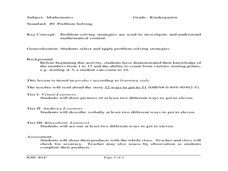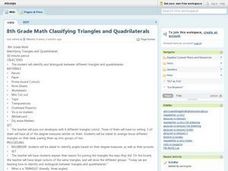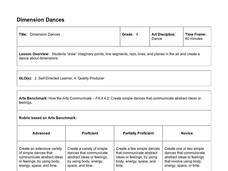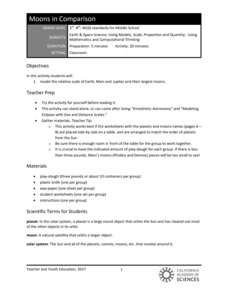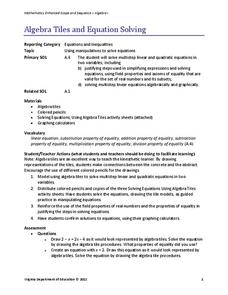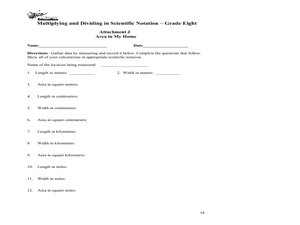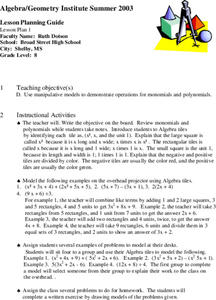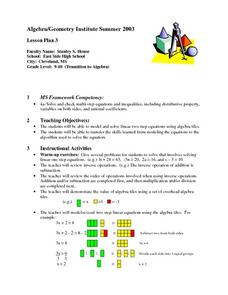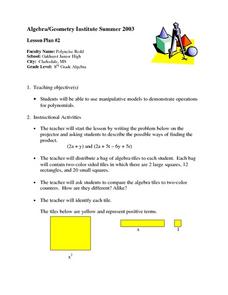Illustrative Mathematics
Counting by Tens
With this daily counting activity, your kindergartners will master counting in sequence automatically from 0 to 100, and will count in multiples of ten to 100. With the whole class, count to 100. With each number, learners will whisper...
University of Exeter
Angles and Turns
Junior geometers investigate the concepts of angles and turns using straws to perform a hands on activity. This is helpful for kinesthetic learners who have a hard time with mathematics. The lesson plan includes the dialogue to be used...
Curated OER
Inequalities and The Order of Operations
Middle and high schoolers investigate how to solve inequalities. The lesson has a good guide for taking pupils through a direct instruction of the concept. You can use counting tiles in order to help kinesthetic learners.
Curated OER
Extending our Knowledge of Place Value
Students demonstrate their knowledge of place value through auditory, visual, and kinesthetic channels. In this place value lesson, kinesthetic learners work with a partner using both sets of hands to represent 2 digit numbers. Visual...
Curated OER
Human Coordinate Plane: An Array of Desks
Use a kinesthetic activity to elucidate ordered pairs and coordinate planes. Arrange desks in a square array and distribute to learners cards with ordered pairs based on the locations of their seats. By having various groups of learners...
Curated OER
Measuring our Hands!
How do we compare? Get your scholars measuring using this interactive and kinesthetic math activity. First, learners compare something (you announce- could be index finger, palm, feet, etc.) to classmates. Consider having them record...
Curated OER
Learning Styles in Math
Students discover which learning style works best for them in a math setting. In this math comprehension lesson, students create different combinations of numbers that equal the sum of 11. Students determine if they are better visual,...
Curated OER
Adding and Subtracting Integers
Middle schoolers use discs in order to add and subtract integers. There are manipulatives present so kinesthetic learners can access the curriculum. They also review the concept of the opposite of positive and negative numbers.
Curated OER
8th Grade Math Classifying Triangles and Quadrilaterals
Eighth graders engage in a lesson that is about classifying polygons with the focus being upon specific triangles and quadrilaterals. They conduct activities using cutouts for kinesthetic learners to help make connections while...
Curated OER
Brother In The Box
Middle schoolers investigate the concept of finding the area of a parallelogram. The lesson plan uses a story that is told as an illustration to help straighten the confusion associated with the concept. Students could construct...
EngageNY
Positive and Negative Numbers on the Number Line—Opposite Direction and Value
Make your own number line ... using a compass. The first installment of a 21-part series has scholars investigate positive and negative integers on a number line by using a compass to construct points that are the same distance from zero...
National Museum of Mathematics
Hands-On Data Analysis
Jump at the chance to use this resource. A kinesthetic activity has classmates jumping in several different ways (standing, single-step, and multiple-step jumps) to create handprints on poster paper taped to the wall. They measure the...
Hawaiʻi State Department of Education
Dimension Dances
Use dance to help learners conceptualize line segments, rays, lines, and planes. They choreograph dances that show dimensional space. Dancers start by pondering space, point, and lines as the teacher draws them in the air. Each movement...
Virginia Department of Education
Matching Representations
Pupils explore the many representations of linear functions by completing a matching activity to connect the multiple representations of a function. They then reinforce the connection as individuals create the different representations...
Curated OER
Multiplication
Students practice their multiplication facts by reinforcement and repetition. Students write facts in their math journals, and use labeled soccer ball and deck of cards to practice multiplying by "number of the day." Play continues until...
Alabama Learning Exchange
Exponents and Division
Create a human fraction to learn about division of exponents. Scholars develop the rule for division of exponents by being part of a human fraction to explore and justify the rule. They also consider zero exponents and negative exponents.
California Academy of Science
Moons in Comparison
Just how big is Earth's moon? With a hands-on simulation, scholars use Play-Doh to model the sizes of the planets Earth, Mars, Jupiter, and their moons. They make predictions as a class, work together to make their models, and discuss...
Curated OER
Yummy Gummy Subtraction
Here is a quick 15 minute lesson intended to introduce subtraction. Learners count and subtract gummy bears to complete 5 problems. The lessons suggest that the gummy bears can be saved and used the next day, but gummy bears get gross...
Virginia Department of Education
Algebra Tiles and Solving Equations
Young mathematicians solve linear equations by drawing models of algebra tiles using colored pencils. To finish, they solve the same equations algebraically and check their answers using a graphing calculator.
Hawaiʻi State Department of Education
Symmetrical Objects
In order to better understand how to locate a plane of symmetry in 3-dimensional objects, learners create a dance. The class reviews dance and math symmetry, then they practice making symmetrical shapes and movements with a partner. They...
Ohio Department of Education
Multiplying and Dividing in Scientific Notation - Grade 8
Here is really nice set of resources on scientific notation. Eighth and ninth graders explore the concept of multiplying and dividing in scientific notation. In this multiplying and dividing numbers in scientific notation instructional...
Curated OER
Polynomials
Eighth graders investigate the concepts and combining them into polynomials. The teacher uses direct instruction for delivery. They can use Algebra to make this lesson hands-on for the benefit of kinesthetic learners.
Curated OER
Solve and check multi-step equations and inequalities
Young scholars participate in a lesson that is concerned with the solving of multiple step equations and inequalities. The use of algebra tiles translates the information well for the kinesthetic learners. Then the skills are used to...
Curated OER
Operations For Polynomials
Eighth graders investigate how to combine polynomials using different operations. The use of tiles is done in order to accommodate those who are kinesthetic learners. The sequencing of the lesson is easy to follow.








